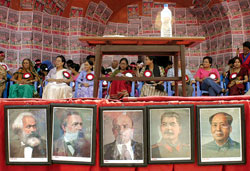|
|
Outperformed by Pushpa Dahal, SPA leadership seems is in disarray. While the Maoist leader goes on a BBC international call-in show, SPA cabinet members speak out against their own government. An ill-considered interim constitution draft is released and criticised. This draft includes, without debate, due process, or a broad mandate, prescriptive fiscal micro-management, social engineering, and division along ethnic lines. One of the drafters himself is now a critic.
The Maoist leadership baits the SPA with threats of an October Revolution, but they aren't thinking of the Bolshevik model. They might be laying the groundwork to follow Maoist China's post-revolutionary purging. To do this, they will cajole people, appear on call-in shows and, importantly, change the goalposts often.
They could also concede something the SPA never really wanted-election to a constituent assembly. They might even tolerate a de-fanged civilian monarchy, since a direct takeover seems unlikely. They don't expect an outright victory in the constituent assembly election without their armed militia policing the polling stations. Their eyes are on the ultimate prize, and backup-a PLA unit within the national army. This is how Mao came to power, by banishing his political rivals, with his People's Army, led by children of his revolution.
The BBC call-in show is thus revealing. The remarkable thing about the callers was that they were real people, honestly speaking their minds. They asked tough questions, unlike many in Kathmandu. They put Dahal on the spot for his killing tactics, and questioned the guilt of unarmed women and children. Pushpa Dahal's coldness was astounding: "I feel sorry for you, but s*** happens during nation building." When asked why he keeps changing the goalposts, including the latest about their commitment to the UN on arms management, he trivialised it saying, "Blame Girija first for starting it in Biratnagar."
The rebel commander did not mention rehabilitation and reconstruction, or truth and reconciliation using the UN. He seemed irritated when asked about the educational aspirations of children under 20 in his rebel army (70 percent), especially by the suggestion that they should be free to go to school to be doctors and engineers, not forced into his army. He focused instead on reformulating the rebels' role within the national security arrangement, emphasising that a merger was not enough.
The SPA leadership has noticed, why else would Girija Koirala risk appointing Rukmangat Katuwal Chief of Army Staff? The SPA knows mainstream political parties can't allow the CPN (Maoist), as a rival political party, to have its own indoctrinated PLA unit in the national army, ready to pounce, as happened in Mao's Cultural Revolution. Yet, the Maoists' 75-point manifesto and the ongoing rhetoric leave space for that. Such a provision for a peaceful resolution worries many. Thus, PM Koirala may have appointed Katuwal as insurance against the Maoists' ultimate goal.
Many in civil society warn against an insurrection in the extreme right, and that may be a real danger. But politicians are adept at doing cost-benefit analyses for their survival and new alliances constantly emerge in power politics. Not long ago, for example, the Maoists wanted to deal with King Gyanendra, not with the very parties they are talking to now. By taking a gamble on pro-ceremonial monarchy line, Prime Minister Koirala may have wanted to create a separate identity for his party and himself, distinct from republican sloganeering including the one coming from his own party rank and file.
Many people, including me, will remain sceptical about the Maoists' intentions as long as they run a parallel government and break the agreement made with the SPA and UN, and ramp up extortion, parallel taxation, kidnapping, and killing. Worse, the extreme right may be using this as a chance to slowly build strength for another showdown with the extreme left.
Alok Bohara, PhD, is professor of economics at the University of New Mexico. He can be contacted at [email protected].




